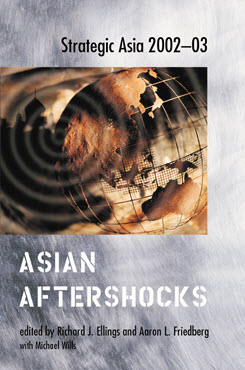Japan (Strategic Asia 2002-03)
Japanese measures to support the U.S. military in Afghanistan after September 2001 and post-Cold War debate about Article Nine of the Constitution have been hailed as evidence of a significant shift in Japanese foreign policy toward both “normality” and closer collaboration with the United States. American strategists who had exhorted Japan to “show the flag” during America’s war on terrorism welcomed the response. Examination of both long- and short-term developments suggests that change has been misrepresented and overstated./p
Is Japan becoming a “normal” nation—one willing to apply military force in a wider range of circumstances than homeland defense, narrowly defined? If so, will it become a more capable political and military partner to the United States? Recent events have led some analysts to answer these questions in the affirmative.
Japanese measures to support the U.S. military in Afghanistan after September 2001 and post-Cold War debate about Article Nine of the Constitution have been hailed as evidence of a significant shift in Japanese foreign policy toward both “normality” and closer collaboration with the United States. American strategists who had exhorted Japan to “show the flag” during America’s war on terrorism welcomed the response.
Examination of both long- and short-term developments suggests that change has been misrepresented and overstated. That noted, major change in Japanese security policy has not been constrained exclusively—or perhaps even primarily—by constitutional or normative inhibitions on the use of force. Rather, Japan’s current foreign policy direction reflects a long-held elite concern for the importance of economic security and the low utility of military action, with pacifism and constitutional constraints frequently invoked to support preferred policies. Hence, even should pacifism continue to decline in Japan—and we acknowledge that it remains and important element in Japanese political discourse, even if sometimes used instrumentally—there may be significantly less change in Tokyo’s foreign policy than is anticipated in the United States. Many conservative political leaders are reluctant to use force, not because they are morally opposed to its employment or because they fear public disapproval at the polls, but because they question its efficacy in a world where—they believe—economic power is more important.
Strategic Asia
The Strategic Asia annual edited volume incorporates assessments of economic, political, and military trends and focuses on the strategies that drive policy in the region. Learn more about Strategic Asia.


